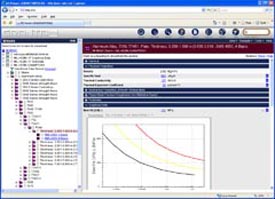Granta Design has announced the next generation of GRANTA MI™, the leading system for materials information management in industries including aerospace, defense, energy, automotive, consumer and industrial equipment, materials production, and medical devices. GRANTA MI version 2.0 builds on a robust, mature environment, enhancing it with guidance from Granta customers including the Material Data Management Consortium (MDMC), a collaboration of world-leading engineering enterprises. New capabilities help such companies to manage their ever-changing materials data more effectively, to apply that data accurately, and to deploy vital design information to engineers enterprise-wide. Granta has also delivered wide-ranging new reference data to support materials-related decision-making.
 Viewing materials information in the enhanced GRANTA MI version 2.0 browser-based user interface. The user is navigating a database of laboratory test data (left pane) and viewing numerical, text, and graphical data for an aluminum alloy (right panel).
Viewing materials information in the enhanced GRANTA MI version 2.0 browser-based user interface. The user is navigating a database of laboratory test data (left pane) and viewing numerical, text, and graphical data for an aluminum alloy (right panel).
GRANTA MI 2.0 introduces two major data management features, version control and data quality ratings, strengthening its position as the industry standard for constructing, managing, and using corporate materials databases. GRANTA MI is the first materials system to implement formal version control, which enables a systematic approach to updating data, captures information explaining changes, and stores all previous versions of any item of data. This helps to control the release of data, retains materials knowledge, and allows recovery of past versions of information. The new data quality rating capability supports the implementation of corporate data quality systems, helping to ensure that data is used appropriately. These benefits are particularly important in sectors such as aerospace or medical devices where data is highly regulated and safety-critical.
Well-managed corporate materials information is only useful if it can be accessed by engineers, scientists, designers, and others that need it. GRANTA MI 2.0 further enhances the usability and appeal of the browser user interface with which these users navigate, search, and view information. Export of data for use in engineering design software is enhanced with new support for Pro/ENGINEER® Wildfire® from Parametric Technology Corporation (PTC). Fully interactive access from computer-aided engineering (CAE) is enabled by a new plug-in for the Abaqus/CAE® finite element analysis (FEA) software from the SIMULIA brand of Dassault Systèmes. This plug-in enables simulation engineers to search, view, retrieve, and apply in-house or reference materials data from GRANTA MI, without leaving their familiar Abaqus/CAE environment. File export or plug-in capabilities can also be built for other third party or in-house applications.
GRANTA MI provides tools that help designers and engineers across an enterprise to make consistent and informed decisions on materials selection and substitution – for example, to optimize costs, rationalize the number of materials types used, or design for low carbon footprint and energy efficiency. Enhancements to the data libraries available with GRANTA MI 2.0 help to ensure that such decisions are based on accurate, comprehensive, up-to-date materials property reference data:
- MMPDS-03, the latest version of the preeminent source of property data for aerospace alloys (formerly Mil-Handbook-5)
- Comprehensive data on materials for power and chemical processing plants, from the authoritative ASME Boiler and Pressure Vessel Code
- New and updated data for selection and positioning of elastomers, rubbers, transparent plastics, and plastics with medical applications Extended coverage of stainless steels and nickel alloys
Across all materials classes, updated information on materials prices and eco properties aids analysis of commercial performance and environmental impact.
“We are proud of the advances in GRANTA MI 2.0 because they deliver critical features that are a high priority for our user community,” comments Dr David Cebon, Managing Director at Granta. “These enhancements reinforce the position of GRANTA MI as an industry standard. This position is validated by customer feedback and the ever-increasing use of the system. Examples of this momentum include Boeing IDS, Northrop Grumman, and Raytheon joining the Material Data Management Consortium in recent months.”